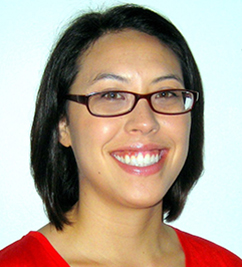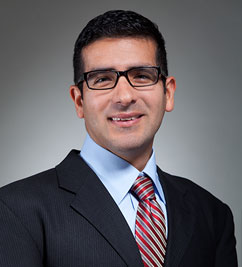UW-Madison FAST Program Shown to Increase School Engagement among Latino Families
January 21, 2015

Megan Shoji
A new study recently published by four UW-Madison education researchers, all graduate students in sociology and fellows in WCER’s Interdisciplinary Training Program in the Education Sciences,1 identifies processes for improving the engagement of low-income Latino families with their children’s elementary schools.
The researchers studied data2 drawn from families in Phoenix, Ariz., and San Antonio, Texas, who participated in the FAST program, an after-school program designed to strengthen relationships between families and schools. Developed within the Wisconsin Center for Education Research in UW-Madison’s School of Education, FAST is used in 46 states and 13 countries. More than 75 percent of the parents in the study self-identified as Latino.
“Due to language or cultural barriers, Latino parents often feel uncomfortable in the school environment, especially when they are unsure whether the school views them as partners,” Shoji said. “When parents felt recognized, respected, and included by the school, as happens in the FAST program, they begin to feel a sense of belonging and engagement.”

David Rangel
For schools looking to replicate FAST’s success at building community, the researchers recommend that schools host engagement activities of interest to families, such as a free meal, a fun experience for children, or a workshop. They also recommended creating an environment that helps facilitate open communication, such as setting up chairs in pods or circles rather than rows, and ensuring ample interaction between school staff and parents.
“The more communal, where everyone is collectively engaged in conversations with each other, the better,” Shoji said.
Parents interviewed for the study said they felt more trust in the school officials who joined them in the FAST program. They also felt more confidence taking an active role in their kids’ education, and more comfortable approaching the school with questions or requests for information.
Moreover, communities historically isolated from schools, such as the low-income Latino families targeted in the study, also benefit through the relationships they form with other families in the FAST program, Shoji said.
“Sharing in the cooperative experiences of the program builds solidarity and trust within and between families,” she said. “Even when those connections are made through the school, the families are more likely to spend time together outside of school and rely on each other for favors like transportation or child care.”
FAST encourages community building, social interaction and parental involvement in schools to help reduce barriers faced by Latino families due to racial/ethnic and class disparities. The program was designed to promote healthy child development by empowering parents and reducing stress, social isolation, and family conflict.
The program involves eight weeks of meetings between families, teachers, and community members, during which participants share a meal and participate in structured social activities, including music, family games, and a parent support group. The program continues with monthly parent-led meetings for another two years.
The researchers, which included co-authors Anna R. Haskins and Kia N. Sorensen, used the concept of social capital – interpersonal relationships that generate mutual benefit – to develop a theoretical framework for understanding how FAST works. Schools have good reason to focus more attention on increasing the social capital of their more marginalized families, Shoji and Rangel said. Research suggests that the children of families who gain social capital in school settings achieve improved academic performance. When a child’s academic resources include social support from parents, teachers and peers, he or she tends to be more engaged in school, demonstrate academic behaviors, and have positive attitudes toward learning.
“It takes deliberate effort on the part of schools to enhance social capital, especially for Latino and immigrant families, who often feel dissonance in interactions with their children’s schools, but the payoff makes this extra effort worthwhile,” Shoji said. “And hopefully, with what we’ve shown, schools won’t have to start from scratch, but can integrate elements of social capital development into what they’re already doing.”
While Rangel said previous research has identified many other benefits of FAST, his study focused on the core methods for how schools that serve low-income Latino communities can create social capital.
“Not every school has the resources to launch a FAST program,” Rangel said. “We wanted to discover and explain how social capital is created, and then distill that into a clear picture so schools that are under-resourced can use that information to improve their own school settings in the best, most financially feasible way possible for them.”
The researchers identified four interactional processes as key to creating an environment conducive to producing social capital: responsive communication; reciprocal communication; shared experiences; and institutional linkage. These four processes often build upon each other to create a larger cumulative effect, but to ensure that they are actually in place, schools must examine and evaluate their current efforts at community-building, Shoji said.
“It’s common sense that communication leads to relationships and relationships provide access to resources, but it’s another thing altogether to actually create an environment where that is taking place,” she said. “The answer is, you build this community by creating shared experiences and facilitating authentic communication among families and school staff, which then leads to shared expectations and values among them.”
1 Author names and current positions: Megan N. Shoji, Researcher at Mathematica Policy Research; Anna R. Haskins, Assistant Professor of Sociology at Cornell University; David E. Rangel, Ph.D. Candidate in Sociology at UW-Madison; and Kia N. Sorensen, Visiting Professor of Sociology at Willamette University.
2 These data were drawn from the Children, Families, and Schools project, funded by the National Institute of Child Health and Human Development (NICHD) and led by Dr. Adam Gamoran, Emeritus MacArthur Professor of Sociology and Educational Policy Studies (UW-Madison) and former WCER Director, Dr. Carmen Valdez, Associate Professor of Counseling Psychology (UW-Madison), and Dr. Ruth Turley, Professor of Sociology (Rice University).


